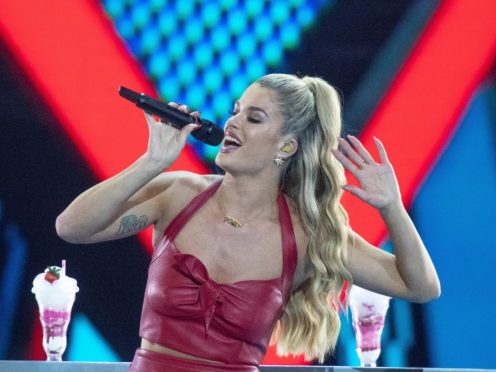Ireland’s Eurovision Song Contest entry has failed to qualify for the grand final following a closely fought semi-final.
Sarah McTernan, 25, was hoping to change Ireland’s recent fortunes in the contest.
The nation has competed 52 times, triumphing on a record seven occasions, but has not won since 1996 with Eimear Quinn’s The Voice.
But her retro-inspired staging and upbeat vocal performance failed to connect with the international audience during the second of two live semi-finals, and she was placed in the bottom eight of the 18 acts.
The 10 finalists going through to the Grand Final of the Eurovision Song Contest on Saturday are:
🇲🇰 North Macedonia🇳🇱 The Netherlands🇦🇱 Albania🇸🇪 Sweden🇷🇺 Russia🇦🇿 Azerbaijan🇩🇰 Denmark🇳🇴 Norway🇨🇭 Switzerland🇲🇹 Malta#DareToDream #Eurovision pic.twitter.com/4YPaP2q2qA
— Eurovision (@Eurovision) May 16, 2019
The Netherlands’ Duncan Laurence – the favourite to win the contest – was among those who did make it through, alongside fellow frontrunners Sweden’s John Lundvik and Russia’s Sergey Lazarev.
Some cast doubt on whether 25-year-old Laurence’s stripped-back staging would connect with an audience watching at home.
Those doubts proved unfounded after his name was called as one of 10 entries through to the 26-strong final on Saturday.
🇮🇪 Strong retro vibes from @Sarah_McTernan and her song 22 for Ireland.#DareToDream #Eurovision #IRL pic.twitter.com/tcaEVnJmY1
— Eurovision (@Eurovision) May 16, 2019
Lundvik also qualified after an emotive performance of his gospel-tinged track Too Late For Love.
Lazarev moved through to the final after wowing the audience with his impassioned performance of the song Scream.
North Macedonia’s Tamara Todevska, Albania’s Jonida Maliqi, Azerbaijan’s Chingiz, Denmark’s Leonora, Norway’s KEiiNO, Switzerland’s Luca Hanni and Malta’s Michela also qualified.
🇸🇪 No @JohnLundvik, it isn't Too Late For Love because we love you!#DareToDream #Eurovision #SWE pic.twitter.com/egFJc4RRpl
— Eurovision (@Eurovision) May 16, 2019
Armenia’s Srbuk, Moldova’s Anna Odobescu, Latvia’s Carousel, Romania’s Ester Peony, Austria’s PAENDA, Croatia’s Roko and Lithuania’s Jurij Veklenko did not.
The public vote made up 50% of the total vote, with the other half determined by a professional jury in each participating country.
The UK, as one of the “big five” countries, along with France, Germany, Italy and Spain, are already assured of a place in the grand final.
Last year’s winners Israel also do not have to qualify via the semi-finals.
